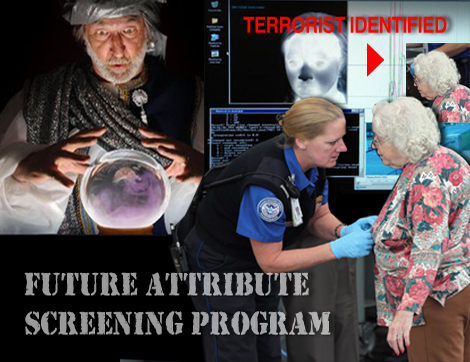
• Serious privacy concerns raised by latest Homeland Security scheme to ‘prevent terrorism’
By Keith Johnson
As if invasive, groping patdowns and humiliating full-body “porno” scanners weren’t bad enough, the Department of Homeland Security (DHS) is working on a project that may make your experience at the airport even more unpleasant. Since 2007, DHS officials have been developing the Future Attribute Screening Technologies (FAST) program that they say will be able to quietly track and monitor citizens at airports and in other public places in order to check for suspicious or shifty people.


According to the DHS, the program is being established “to determine whether technology can enable the identification and interpretation of a screened subject’s physiological and behavioral cues or signatures,”which, in turn, “will allow for security personnel to remotely (and therefore, more safely) identify diagnostic cues of malintent.”
If this sounds like something out of a science fiction movie, you’re not far off. In the 2002 neo-noir sci-fi film Minority Report, police detectives use mutated human psychics assigned to a special “precrime” unit to predict future crimes and make arrests before an alleged would-be perpetrator has a chance to carry them out.
In real life, the DHS plans to utilize a variety of sensors placed in key positions to capture such things as video images and audio recordings, as well as cardiovascular signals, pheromones, perspiration, changes in the electrical properties of the skin in response to stress or anxiety and respiratory measurements.
Unlike a polygraph examination, however, none of the sensors comes in contact with a person’s body, making it possible for the government to remotely make assessments without first obtaining consent.
In other words, the technology will be constantly spying on travelers to see who’s breathing hard, sweating too much or seems nervous. This has raised significant privacy concerns.



“We think you have an inherent privacy right to your bodily metabolic functions,” Jay Stanley, director of the ACLU’s Technology and Liberty program told AlterNet in a 2009 interview. “Just because somebody can build some high-tech piece of equipment that can detect your pulse and perspiration and breathing and heart rate, that doesn’t mean that it should be open season to detect that on anybody without suspicion.”
There is also the concern about just how reliable these systems are at spotting actual potential terrorists. So far, DHS has conducted experiments with voluntary test subjects and can only claim 70% accuracy.
Having performed thousands of polygraph examinations, this AFP writer finds the FAST program nothing less than absurd. While certain physiological indices can be indicative of malicious intent, they cannot be evaluated without certain control measures performed inside a formal testing environment. In the absence of that, there is no way to determine if a subject’s general nervous tension is related to normal jitters or something nefarious.
——
Keith Johnson is an independent journalist and the editor of “Revolt of the Plebs,” an alternative news website. Keith is also a licensed private detective.

